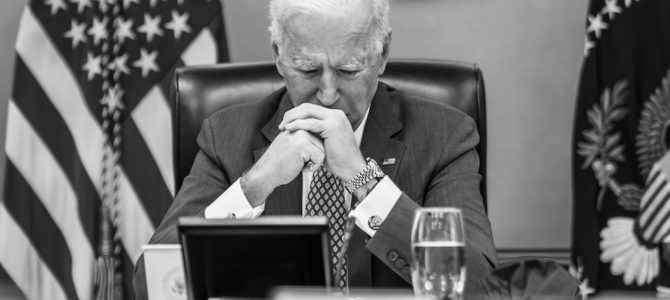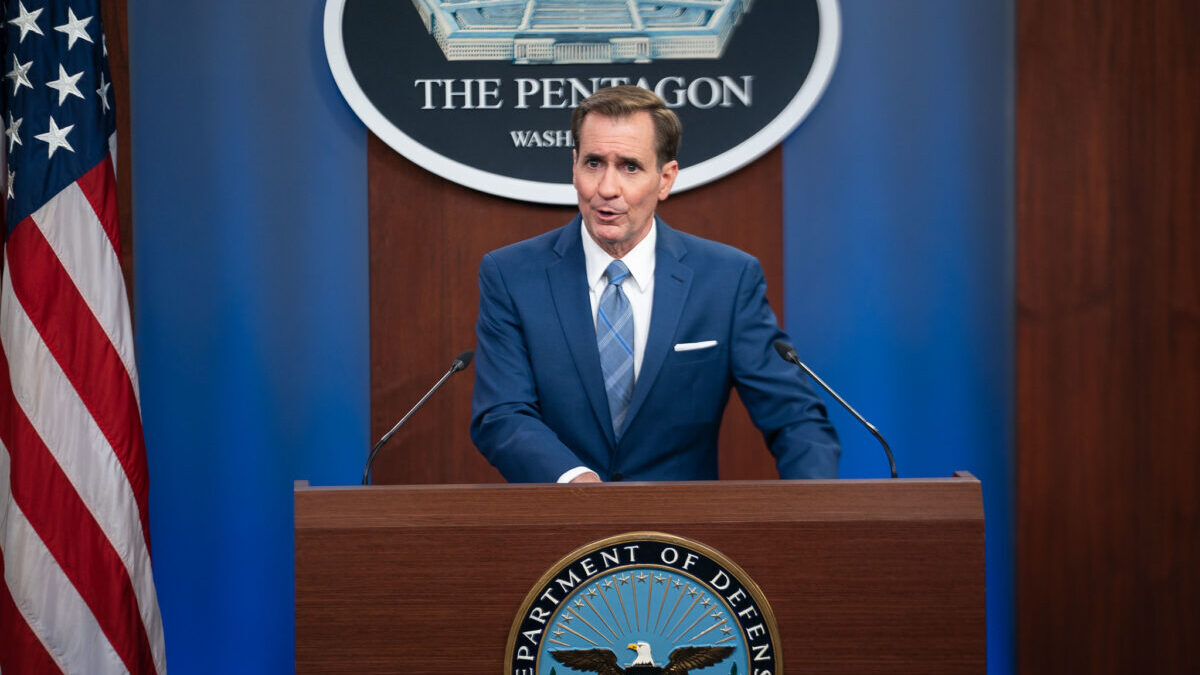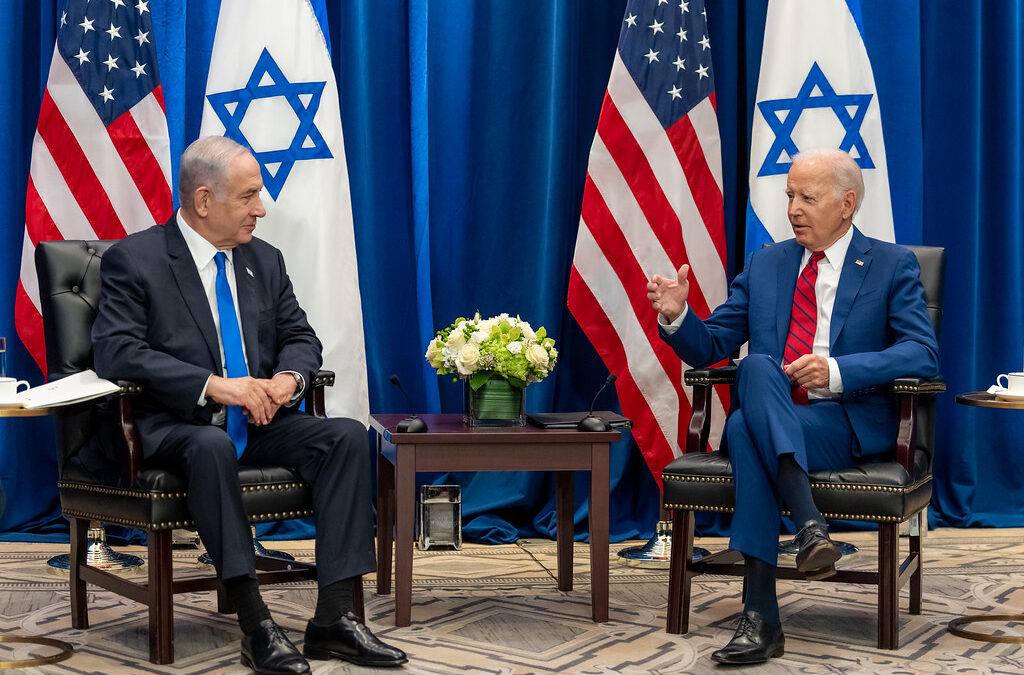
The most important takeaway from the recent G7 and NATO summits in Europe isn’t President Biden’s many embarrassing and unsettling mental lapses, long pauses, and rambling non sequiturs, but the clear message coming out of these meetings: the United States is returning to an Obama-Biden era “America Last” foreign policy that puts the interests of multilateral institutions and international partnerships above the interests of the American people.
That policy shift was perhaps best encapsulated in a quip from President Emmanuel Macron of France, who said of Biden, “It is great to have a U.S. president who’s part of the club and very willing to cooperate.” And of course it’s true. At the close of the G7 Summit, Biden boasted that America is “back at the table,” and described the summit as “extraordinarily collaborative.”
So what did this extraordinarily collaborative club manage to accomplish? One of the G7’s most pressing tasks heading into the summit was what, if anything, it would do about an aggressive and intransigent China. What the group settled on was doing almost nothing.
With each passing week it becomes more obvious that COVID-19 almost certainly originated in a lab in Wuhan, China. We can’t say for sure because the Chinese Communist Party has been blocking efforts to discover the origins of the virus ever since the outbreak began. But at this point, with zero evidence that the virus emerged naturally, the answer seems obvious enough.
Yet all the G7 could manage was a tepid call for a new World Health Organization-backed study on COVID’s origins, as if another investigation by the compromised WHO will yield something more. The G7 also cooked up a plan to dump $40 trillion into infrastructure (a bill likely to be footed largely by American taxpayers) for the developing world to compete with China’s Belt and Road initiative.
At the summit’s close, the group’s final communiqué made no mention of China’s systematic persecution of Muslim Uyghurs or other minority religious groups, and made no real commitment to combat China’s use of forced labor. Instead, the group weakly called on Beijing to respect “fundamental freedoms, especially in relation to Xinjiang.” Yeah, that’ll show them.
Or consider the Biden administration’s plan for dealing with Russia. Biden’s meeting with Russian President Vladimir Putin this week comes hot on the heels of recent cyberattacks against U.S. infrastructure likely backed by Moscow, as well as Biden’s capitulation on the Nord Stream 2 pipeline, which will give Russia remarkable leverage over Germany’s energy supply.
Democrats complained endlessly that Trump wasn’t tough enough on Russia, but so far Biden has projected nothing but weakness toward Moscow. The president also doesn’t seem up to the task of dealing with Putin.
Ahead of the much-anticipated meeting, Biden gave a bizarre press conference on Monday, pausing for an uncomfortably long time and seeming to lose his train of thought when asked a basic question by CNN’s Jeff Zeleny about whether Biden still considers Putin a “killer.” In the end, he essentially said nothing.
President Biden is asked by CNN’s Jeff Zeleny about if he still believes Vladimir Putin is a “killer”
Watch what happens:
pic.twitter.com/D3JcKcQ36I— Daily Caller (@DailyCaller) June 14, 2021
But Biden need not say much of anything on Russia. The idea that warmed-over Obama-ism is going to give Putin pause is a joke. Recall that it was on Obama’s watch that Moscow began a permanent occupation of Abkhazia and South Ossetia in Georgia, annexed Crimea, started a war in southeast Ukraine, intervened in Syria, established operational bases in the Middle East, and gave shelter to Edward Snowden.
Biden said Monday that in his meeting with Putin this week he’s going to “make it clear what the red lines are.” But after eight years of Obama and Biden’s disastrous foreign policy the whole world knows exactly where the red lines are — and exactly what they’re worth.
In all of this, Biden maintains the long trajectory of his abysmal foreign policy record. Over the past four decades the world has changed much, but Biden hasn’t. He has been wrong on almost every major international issue of his time, often for shallow, partisan reasons.
Indeed, his reflective hostility to President Trump’s foreign policy is reminiscent of his hostility toward President Ronald Reagan’s foreign policy. After a Biden speech at Harvard in 1987, Washington Post columnist Richard Cohen remarked that Biden “has a reputation as a politician whose intellect is no match for his glibness.” Biden’s problem, wrote Cohen, is that he purports to tackle difficult questions like when the United States should use force in pursuing its foreign policy goals, but then never bothers with the details.
He set out three criteria: (1) Only if our vital interests are threatened. (2) Only if the intervention is ‘right.’ (3) Only if the use of force has a ‘high probability of succeeding.’
All of that sounded good, but Biden never bothered to explain his terms. He mentioned Nicaragua as an example of where the Reagan administration had failed to apply those criteria. But these happen to be precisely the criteria the president says he has used. Reagan says Nicaragua is vital, that the fight against an avowedly Marxist regime is ‘right,’ and that the effort to topple the Sandinistas would have ‘a high probability of succeeding’ if only Congress would fund the effort.
Similarly, Biden characterized U.S. escalation in the Persian Gulf as reactive, which surely it is, but he did not say what he would do differently if he were president. Several times, he said the containment policy, first enunciated by Harry S Truman, is outmoded. But he never acknowledged that the Reagan administration agrees — and has set out to roll back communist advances.
Today, Biden seems similarly out of touch. One of the reasons Trump quickly gained so much support in the 2016 GOP primaries, and continues to enjoy broad support among Republicans, was his willingness to criticize the failures of a bipartisan, multilateralist foreign policy that has dominated Washington for decades, and that particularly dominated the Obama White House.
Trump criticized America’s endless wars and interventions overseas, especially in Iraq and Afghanistan, even if it meant going after fellow Republicans. He questioned the usefulness of NATO and argued that America’s allies weren’t paying their fair share. He eschewed multilateral treaties and agreements, preferring to deal with other nations one-on-one. In other words, Trump directly attacked the foreign policy establishment in Washington — the “blob” — and it resonated.
Why? Because such attacks tapped into a general sense among many Americans that, whatever the original justification for entities like NATO and the United Nations and the WHO, they no longer serve the interests of the American people, and our leaders should stop pretending that they do.
Biden, by contrast, wants to return to the foreign policy of the Obama era, in which being “part of the club,” means deferential multilateralism that places the American national interest behind the interests of a vast array of allies and partners and international organizations all across the globe. The very notion of national interest, let alone a foreign policy that serves the national interest, is anathema to the foreign policy blob in Washington.
And so it is once again. The Obama-era foreign policy that Biden is trying to resuscitate — weakness toward China and Russia, deference to a comprised WHO, money for Iran, more U.S. troops and NATO funding for Europe, climate change and wokeness at the State Department and the Pentagon — is not for Americans, it’s for the global institutions and interests that benefit from maintaining a pre-Trump foreign policy status quo that puts America, and Americans, last.









